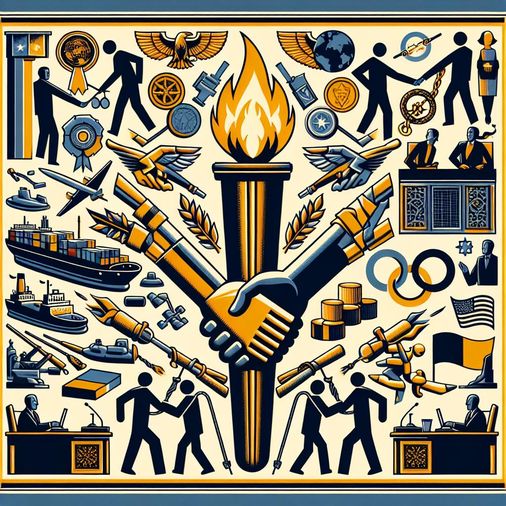Macron's Olympic Embrace: A Balancing Act Between Sports Success and Political Tensions

French President Emmanuel Macron, well-known for his warm and enthusiastic interactions with sports stars, has taken his affectionate approach to new heights during the Paris Olympics. His display of camaraderie was vividly showcased when he comforted Kylian Mbappé after the nation's defeat to Argentina in the last World Cup, awkwardly pulling the footballer close in a hug.
At the recent Olympic Games, Macron’s touchy-feely demeanor has genuinely resonated with France’s athletes. On the judo mat, for instance, the president shared a close, backslapping embrace with Teddy Riner, the nation's celebrated gold medallist. He also showed heartfelt appreciation toward bronze medallist Romane Dicko, offering a lengthy hug and gently wiping her tears of disappointment.
Macron’s gestures didn’t stop there. After France captured its first gold in men’s rugby sevens at the Stade de France, he grasped scrumhalf Antoine Dupont’s face, thanking him earnestly for the accomplishment. Additionally, he seized the moment with swimmer Léon Marchand, grabbing his hand after a victorious race. Political adversaries have criticized Macron for his overt displays at carefully orchestrated events celebrating the national team’s successes, deeming his presence awkward.
However, Macron is keenly aware of how sports can galvanize the French populace, much akin to the post-1998 euphoria following France's victory in the FIFA World Cup, when former president Jacques Chirac enjoyed a bump in popularity. Currently, Macron’s popularity remains modest; an Elabe poll conducted in early August revealed that 27% of French citizens believed in his capability to address the nation’s challenges, marking a slight increase from the beginning of July.
As the Olympics reach their conclusion, Macron will be thrust back into a tangled web of domestic politics. In a strategic move, he called for a snap parliamentary election shortly before the Games, a gamble influenced by the far-right party’s unexpected gains during the European elections. While the far-right surged in the first round of parliamentary voting, a coalition of center and left parties banded together, ultimately securing a majority in seats but failing to achieve a governing majority.
Now, Macron finds himself pressed to appoint a new prime minister ahead of the Paralympic Games opening ceremony on August 28, yet no clear candidates from any party have emerged. He has labeled this extended period of Olympic celebration as an 'Olympic truce,' sidelining pressing political affairs with a caretaker government that has already resigned under the previous parliamentary structure.
Despite spending part of the Olympic period at his Mediterranean summer residence, Macron returned promptly for key events, especially on August 2, dubbed 'Gold Medal Friday' in France. His day included quick visits to equestrians, beach volleyball matches, judo championships where he consoled Riner and Dicko, swimming victories, and BMX racing, where France triumphed in multiple medal categories.
In a bid to maintain the excitement around the Games, Macron announced a celebratory parade for French athletes down the Champs Élysées on September 14, followed by a reception at the Élysée Palace. However, the true political benefits he may reap from the Olympics remain uncertain. Before the games, public sentiment was filled with pessimism, especially concerning the snap election and Macron’s handling of the political aftermath.
While sporting triumphs can ignite national pride, they do not necessarily solidify political stability, as shown by the backlash against Macron in the past amid civil unrest following the 2018 World Cup victory. Furthermore, the intricate dynamics of the political landscape surrounding the Games—the collaborative effort between local leftist leaders and Macron’s centrists—remains a point of contention. As the new parliament grapples with divisions and the challenge of passing a budget this autumn, it remains to be seen if the Olympic spirit can indeed bridge the political gaps or if it will merely serve as a transient boost in morale.
Related Sources:
